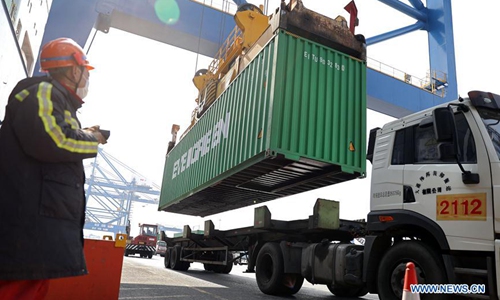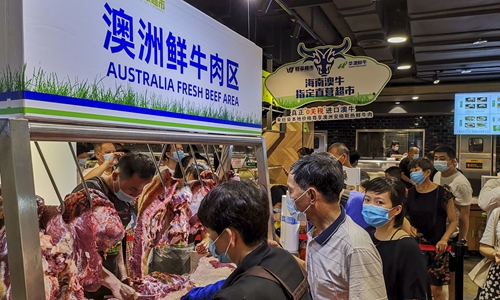US extends some tariff exclusions on Chinese smart watch, medical products till year-end

Photo taken on March 25, 2020 shows the dock in Dalian, northeast China's Liaoning Province. As the coronavirus pandemic has been subdued in China, Dalian port saw an increasing container throughput in the past two weeks. (Xinhua/Yao Jianfeng)
The US Trade Representative Office (USTR) announced that it will extend tariff exclusions on a wide range of products including smart watch and medical mask through December 31, 2020, a move observers said shows that the world's two largest economies are living up to their promise to create conditions for the implementation of the hard-won phase one trade agreement after holding a call last week.
The original one-year exclusions on those Chinese imports from "Section 301" tariffs imposed by US President Donald Trump was set to expire on September 1. The USTR extended the exclusions by four months this time.
Products on the list include smart watch, fitness tracker and wireless communication equipment, some of which could be imported by US tech companies including Apple and FitBit. Also, medical products such as face mask, facepiece respirator and other medical items are also exempted from tariffs until year-end.
"The US presidential election will be held in November and a power transition, if any, is set to take place in January next year. So it's a pragmatic choice for the Trump administration to only extend the tariff exemptions by four months till the year-end," Gao Lingyun, an expert at the Chinese Academy of Social Sciences in Beijing who closely follows the China-US trade frictions, told the Global Times on Wednesday.
He also stressed that the announcement from the US side is a positive gesture showing that the implementation of the phase one trade deal is on the right track.
As a key part of the phase-one trade deal signed in January, the US has agreed to cut some tariffs on Chinese goods in exchange for China's purchase of more US agricultural and energy products. Specifically, the US will cut by half the tariff rate on $120 billion Chinese goods to 7.5 percent.
Bai Ming, deputy director of the international market research institute at the Chinese Academy of International Trade and Economic Cooperation, a think tank under the Ministry of Commerce, told the Global Times on Wednesday that the move also showed that the US-initiated tariff war has not eroded the competitiveness of "Made in China" products, but rather has ramped up costs for US consumers amid the economic fallout of the pandemic.
Huang Jinyun, general manger of Shenzhen-based smart watch maker Aibaohu Tech Co, told the Global Times that its exports to the US had grown by about 20 percent year-on-year since mid-June. The US market accounts for 15-20 percent of the company's revenue.
"Demand from the US remains strong and we're preparing exports for the Christmas holidays," Huang said.
Chinese Vice Premier Liu He held a phone conversation with US Trade Representative Robert Lighthizer and Treasury Secretary Steven Mnuchin last week at the latters' invitation and the two sides had "constructive" dialogue over the phase one deal, the Xinhua News Agency reported.
The call was by far the most positive communication between China and the US in recent weeks amid fraying relations, which also reaffirmed both sides' commitment to the phase one deal.
But analysts also warned that uncertainties still persist as to whether the US will honor the agreement after presidential election in November.
"The phase one trade deal has not been reviewed by the US Congress and is therefore not a legislation. If the Democratic Party wins the election, there could be certain modification to the deal, and China needs to be prepared for such uncertainty," Gao noted.




